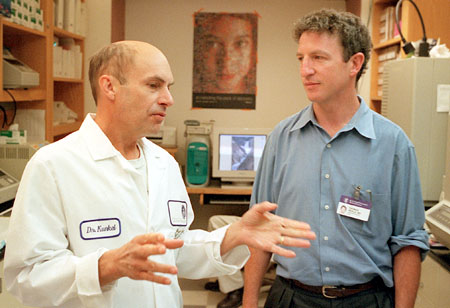Genes associated with long life pinpointed

Researchers at Harvard-afilliated Beth Israel Deaconess Medical Center, Children’s Hospital, and other institutions have pinpointed a region on human Chromosome 4 that is likely to contain a gene or genes associated with extraordinary life expectancy. Their findings, reported in the Aug. 28 issue of the Proceedings of the National Academy of Sciences, may lead to a better understanding of the aging process.
“This is the first study to use humans to try to find genes that play a role in life span,” said Assistant Professor of Medicine Thomas Perls, one of the study’s co-authors and a geriatrician at Beth Israel Deaconess and director of the New England Centenarian Study. “Many investigators thought longevity was far more complex a trait that wouldn’t be influenced by just a few genes.”
According to Louis M. Kunkel, chief of genetics at Children’s Hospital, whose lab performed the genomewide scans on 137 sets of two or more exceptionally long-lived siblings in the study, “We have known that only a few genes influence longevity in lower organisms and that now appears to be true in humans.”
One in 10,000 Americans is a centenarian, topping the average life expectancy by 20 years. Despite their rarity, centenarians are the fastest growing segment of the U.S. population, according to Perls.
The prevalent belief among researchers in the field of aging research has been that as many as 1,000 genes influence aging. Kunkel, Annibale A. Puca, a research fellow in pediatrics, and their colleagues in the Division of Genetics at Children’s Hospital were able to pinpoint a region on Chromosome 4 in humans containing one, or at most, a few longevity-related genes by looking at the trait of exceptional longevity, rather than genes responsible for age-related diseases. Having found the region in which this gene or genes lie, the group intends to identify the exact gene or genes responsible for longevity.
Scientists have long wondered what enabled centenarians to maintain good health for so long. The study authors hypothesize that centenarians have a history of aging very slowly and either markedly delay age-related diseases – such as cardiovascular disease, stroke, diabetes, cancer, and Alzheimer’s disease – or avoid them altogether.
The researchers sought the characteristics to explain the disease-resistance and survival advantage characteristic of a group of individuals age 98 and older. Because centenarians are hard to find, they opened their search globally. In the process of taking medical histories it was discovered that many of the subjects also had long-lived siblings. In a previously published study by Perls, the centenarians’ brothers and sisters had a four times greater chance of living to age 91 compared to siblings of a control group.
“Once we discovered that living to 100 was a terrific advantage, then, of course, we wanted to find out how and why they were able to have such a long and healthy life,” Puca said. They suspected genetics played a larger role than the environment. The suspicion was enhanced when they found numerous families with many exceptionally old siblings.
DNA was extracted from whole blood obtained from 137 so-called sibships – centenarians and one or more siblings (ages 91 to 109 years) – for a total of 308 people predominantly of European descent. Co-authors Kunkel and Puca, then performed a sibling pair linkage study, using 400 markers spread along the entire human genome to find any region their subjects had in common.
The search led them to a region on Chromosome 4 that contains between 100 to 500 genes. They are 95 percent certain that area is the right place to search for specific genes that are in part responsible for exceptional longevity.
Once those genes are uncovered, scientists would like to understand the biochemical pathways the gene or genes affect to promote longevity. The authors speculate that such insight could lead to the development of drugs that mimic what centenarians possess genetically to escape the adverse consequences of aging.
“We’re not trying to find the fountain of youth. If anything, we’re trying to find the fountain of aging well,” Perls said.




